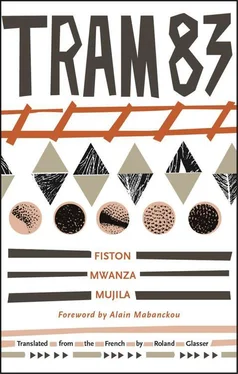A genuine postcolonial couple sat beside them. The man, who looked about twenty, his hands all over the bust of his spouse, a seventy-eight-year-old lady, as Requiem confirmed, recited his breviary: “You have a smile that perturbs me deeply. I love you day and night. I love you Monday, Tuesday, Wednesday …” He could only be a student, or a civil servant in a small state firm gone bankrupt. It’s a waste to be young in this part of equatorial Africa. The under-thirty-fives are potentially embittered, xenophobes, crooks, hucksters, capable of using any ploy, be it jazz or a balancing marriage, to escape the prison that is poverty.
“The phenomenon of rebalancing, of matching, and of corporeal integration relates to both cases,” Requiem continued, between two smokes. “I spent some six months managing an agency that facilitated meetings between young men and adult women, or baby-chicks and tourists.”
“Do you have the time?”
“Go check your papa’s watch!”
The clientele smoked like crazy, identified with the jazz, groped each other in the dark, and grabbed at the single-mamas. A sullen-faced waitress finally came. Spitefully, she placed on the table the two bottles of beer she was supposed to have served them an hour and a quarter ago. They paid the check but she stood there waiting for her tip. They made as if nothing was up. She cottoned on to the strategy and cunningly counterattacked by refusing to open the merchandise. Lucien took out a coin but Requiem stayed his hand.
“RULE NUMBER 1: never let yourself be intimidated by a waitress struck with hysteria. We’re not in Moscow. Tipping is obligatory here. But we who are familiar with the New World are an exception. We crush any attempt to make us tip by force. Let the waitresses file a complaint! The mines and their tourists know me. They know me, the tourists and mines.”
She was having none of it.
“Gigolo!”
“Tipping is an archaism, I give when I like.”
To close the case, they decided to open the bottles with their teeth. Offended, she insulted them, threatened them with a penknife, picked up the glasses, and vanished. They began to drink straight from the bottles. The musicians continued their ramble, the tourists too, the young man and his ageless-woman, the girls with the round-juicy-breasts trotting out their one and only hymn:
“Do you have the time?”
“Maybe …”
Lucien took out his notebook, wrote: “This is not a bar. Where will they go to let off steam when there’s no more women to match their fantasies? Where will they go to deposit their seed? Where will they go to drown their misfortunes when there’s nowhere left to get hammered? Where will they go to shake their hips when there’s no more salsa? Salsa and jazz are not eternal; what will they do to identify with the Azerbaijani tourists?”
Requiem received phone calls, which he answered before continuing: “Good evening sir, good evening lieutenant, would Madame like, good evening citizen, RULE NUMBER 10, you-touch/you-play, double or quits, loser wins, the legend round here says the City-State dies on its feet, is sir Belgian?”
As the beer flowed, they held fast to the obvious. The backwash had cleared the way for them. They could no longer sing from the same hymn sheet. They were just two life forms adrift in a city become a state by force of Kalashnikovs.
“Tip!”
The government army and the dissident rebels fought each other day in, day out. To get things back on track, the international community had sponsored nineteen sovereign national conferences which had all come to less than naught. Despite its soldiers trained in China, Sudan, Angola, and Cuba, the central government had failed to wring the neck of the rebellion, which reproached the central government for hanging on to the lion’s share. “Without our province, this country is a masquerade,” thundered the dissident General. “We can’t make do with crumbs when it’s we who are feeding you.” The rebels fought with arrows, machetes, and slingshots. They brought a witch doctor up to the front line with them, and observed all sorts of prohibitions supposed to render them invulnerable: sexual abstinence of unlimited duration, no bathing, or eating beef, or wearing shoes, and so on. Exasperated by the length of the conflict, the rebels retreated to a small stretch of land in the extremely wealthy and coveted province they called the City-State. And as if that weren’t enough, they gave the former national territory, which was pointlessly vast, as barren as one could wish, and crossed by a wide river that served practically no purpose except to flow toward its ocean suicide, the name Back-Country.
The varyingly moneyed tribes stormed the capital of the City-State, the smallest capital in the world, barely comprising a bar, the famous Tram, and the station whose unfinished metal structure brought to mind the figure of Henry Morton Stanley. The legend places these tribes into three categories.
First category: individuals who live by day, most of whom are civil servants saddled with many months’ worth of non-payment, the detail of which they alone possess, but they’re all up to their necks. They lived miserably even before the secession.
“Do you have the time?”
The second category comprises sleepwalkers. They’re scared of croaking in their sleep, it seems. Reason for which they guzzle a potion that keeps them on standby, day and night. This group includes the students, the diggers, the baby-chicks, the for-profit tourists, and the friends and close collaborators of the Dissidence.
Finally, the most hardheaded category, in which we find the single-mamas, the human organ dealers, the child-soldiers with their Kalashnikovs, the apostles, the night waitresses and busgirls, the musicians from the former Zaire, the bandits, and other burglars. They sleep during the day. They know, more than any man, how to make both ends of the week meet. Honorary doctors in all fields (corruption, drugs, sex, looting, minerals, embezzlement, serious drinking …), the night is their main stock-in-trade.
The jazzmen retired to a Gillespie tune, “A Night in Tunisia.”
Three Nigerians, sagging at the knees, thick prescription glasses, Afro hair, bell-bottom pants, striped shirts, took over. Tree that obscures the forest, their only song, “Life Cries Out, When Will You Wipe My Tears?” stretched away on its thirteen verses till daybreak.
“We’re in for four hours of balladry,” whispered Requiem, staring at the young lady appraising them from the gallery.
The Nigerians, who hailed from Ogbomosho, recounted the adventures of a princess “who alighted in the City-State one January night and succumbed to the charms of a married digger with two children. She befriended the wife of her lover, whom she showered with gifts.” The rest of the saga remained a mystery to all, since the final six verses were in Igbo, Yoruba, and Hausa.
“Tip …”
“Why do you keep going to the restroom? You’ll piss your brains out.”
“Do you have the time?”
This second part of the song triggered weeping and gnashing of teeth. One of the trinity shattered the ceiling with his husky voice honed by second-lip cigarettes, electrifying the entire Tram. While the Nigerians wailed, a bare-breasted-single-mama, armed with a shopping basket, walked between the tables. The for-profit tourists, the miners, the students, the waitresses, the busgirls, the itinerant Pentecostal preachers, the high priests of the Second Republic forced back from their golden exile, and other derelicts of life repented, opened their hearts, and chucked in some coins.
“Do you have the time?”
Requiem sipped from the bottle, his left hand stuffed down his pants.
“You’re never safe from some kind of poisoning,” he trotted out, as if to denounce the austere demeanor of the waitresses and busgirls.
Читать дальше












